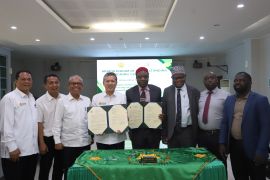AntaraJakarta (ANTARA) - Of the 8000 rare disease in the world, at least four were found in Indonesia, namely Mukopolisakaridosis (MPS) type II, Gaucher, Pompe, and Glucose-Galactose Malabsorption (GSM).
This was revealed by Pediatrician, nutrition and metabolic diseases, from RSCM, Dr. Damayanti Rusli Sjarif, SpA (K), during a dialogue on "Challenges and Expectations of Rare Disease Patients in Indonesia" in Jakarta on Wednesday.
Stating that 80 percent of these diseases were genetic, Damayanti said, "There are an additional 250 cases (rare diseases) every year in the world. A disease is referred to as rare if the number of patients is under 2,000.".
Type II MPS
MPS type II is caused by the lack of iduronate sulfatase enzyme activity. It occurs in one of 100,000 people and 170,000 cases were experienced by men, as stated in mpssociety.org.
Some individuals will experience developmental delays and physical problems due to type II MPS.
In infants, there are no visible symptoms, but with more cell damage, the signs are more visible. General symptoms include failure to develop several organs, a typical face shape and an abnormal body frame.
Umar Abdul Azis (7) suffered from this disease. His mother, Umar Fitri, said her son was diagnosed with MPS type II at the age of three years and seven months.
"Umar is now seven years old and has been admitted to a special kindergarten. When he was five, he suffered a setback," Fitri said at the event, which was also attended by parents of patients with rare diseases in Indonesia.
According to her, at first, Umar experienced motoric delays and his colds went on for a year. After going back and forth to get treatment at the Tangerang regional hospital, Umar was referred to the RSCM, where he was diagnosed with type II MPS.
Gaucher
As revealed in Mayo Clinic, the disease is caused due to the buildup of certain fatty substances in organs, especially the spleen and the liver, which affects their functioning.
Fat can also accumulate in the bone tissue, weaken the bones and increase the risk of fractures.
In general, patients witness an enlarged stomach, pain in the bones and joints, and are easily tired.
Amin Mahmudah from Jambi revealed that her daughter, Athiyatul Maula (two years and four months), experienced this condition, as did her son Sukron. However, Sukron died when he was two years and five months, as he was diagnosed too late.
Pompe
Pinandito Abid Rospati (4) suffers from this disease. His father, Agus Sulistoyono, revealed that before being diagnosed with Pompe, Dito often experienced shortness of breath and now relies on a ventilator to breathe.
As reported by Raredisease.org, Pompe is a multisystem disorder caused by variations in pathogens in the GAA gene that contain information on the production and function of a protein called alpha-glucosidase acid (GAA).
Because of this lack of protein, complex sugars or glycogen cannot be degraded into simple sugars such as glucose. Glycogen also builds up in the muscles.
Those suffering from Pompe also have a typical heart problem - dysfunction due to an enlarged heart - in addition to the weakening of muscles. Patients also experience problems with breathing.
Malabsorption of Glucose-Galactose (GSM)
GSM is a genetic metabolic disorder, where the small intestine is unable to digest, channel and absorb glucose and galactose. Of the 200 cases worldwide, two-thirds of them occur in women.
The symptoms of this disease can be seen from the day the baby is born and receives lactose from milk. Generally, patients experience chronic diarrhea, dehydration and weight loss.
Translator: Eliswan Azly
Editor: Suharto
Copyright © ANTARA 2019











